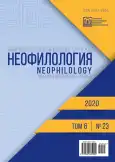Mistakes in gender categorization in speech production of foreigners studying Russian
- Authors: Schelokova A.A.1
-
Affiliations:
- Ural State University of Railway Transport
- Issue: Vol 6, No 23 (2020)
- Pages: 496-502
- Section: ЯЗЫКОЗНАНИЕ
- URL: https://journal-vniispk.ru/2587-6953/article/view/302810
- DOI: https://doi.org/10.20310/2587-6953-2020-6-23-496-502
- EDN: https://elibrary.ru/FCJWKI
- ID: 302810
Cite item
Full Text
Abstract
The failure to determine the grammatical gender category of adjectives, ordinal numerals and possessive pronouns in the speech production of foreigners representing a monoethnic (Chinese) group of students is considered from the perspective of cognitive linguistics. The analysis of the written works and oral statements of students studying Russian as a foreign language reveals a mechanism that leads to typical mistakes in this aspect of Russian grammar. Categorization by gender of nouns occurs through cognitive mechanisms of correlation and comparison, namely: by biological gender – motivated, by formal attribute – unmotivated; categorization by gender of adjectives, possessive pronouns and ordinal numerals, as the categorization of secondary (unmotivated) features, is absent for foreign residents. Accordingly, for a foreigner, a cognizable category that does not have an ontological character becomes a difficult obstacle to overcome at the initial stage of language learning.
Keywords
About the authors
A. A. Schelokova
Ural State University of Railway Transport
Author for correspondence.
Email: aschelokova@usurt.ru
ORCID iD: 0000-0002-1498-4720
Lecturer of Foreign Languages and Intercultural Communication Department
Russian Federation, 66 Kolmogorova St., Yekaterinburg 620034, Russian FederationReferences
- Zabotkina V.I., Boyarskaya E.L. Yavleniye polisemii i kategoriziruyushchaya deyatel’nost’ soznaniya [The phenomenon of polysemy and categorizing mind activity]. Kognitivnyye issledovaniya yazyka – Cognitive studies of language, 2010, no. 7, pp. 60-68. (In Russian).
- Boldyrev N.N. Yazykovyye kategorii kak format znaniya [Linguistic categories as a format of knowledge]. Voprosy kognitivnoj lingvistiki – Issues of Cognitive Linguistics, 2006, no. 2, pp. 5-22. (In Russian).
- Zhuravlev A.P. Kategorizatsiya deystvitel’nosti kak chast’ kognitivnoy funktsii yazyka [Categorization as an aspect of cognitive function of the language]. Izvestiya Samarskogo nauchnogo tsentra Rossiyskoy akademii nauk. Seriya Sotsial’nyye, gumanitarnyye, mediko-biologicheskiye nauki – Izvestiya of the Samara RAS scientific center. Social, humanitarian, medicobiological sciences, 2017, vol. 19, issue 5, pp. 62-65. (In Russian).
- Kubryakova E.S. O meste kognitivnoy lingvistiki sredi drugikh nauk kognitivnogo tsikla i o eyë roli v issledovanii protsessov kategorizatsii i kontseptualizatsii mira [On the status of cognitive linguistics among other cognitive sciences and its role in the research of world categorization and conceptualization processes]. Kognitivnyye issledovaniya yazyka – Cognitive studies of language, 2010, no. 7, pp. 13-18. (In Russian).
- Serova I.G. Na perekrestke lingvisticheskoy, estestvennoy i kul’turnoy kategorizatsii [At the crossroads of linguistic, natural and cultural categorization]. Vestnik Tambovskogo gosudarstvennogo tekhnicheskogo universiteta – Transactions of the Tambov State Technical University, 2005, vol. 11, issue 3. (In Russian). Available at: https://cyberleninka.ru/article/n/kategoriya-roda-v-yazyke-na-perekrestke-lingvisticheskoy-estestvennoy-i-kulturnoy-kategorizatsii (accessed 23.03.2020).
- Ovchinnikova E.V., Kuzmina V.M. Vliyaniye gendernykh stereotipov na opredeleniye roda imen sushchestvitel’nykh uchashchimisya – nositelyami kitayskogo yazyka [The influence of gender stereotypes on the gender determination of nouns by native Chinese students]. Doklady 9 Mezhdunarodnoy nauchno-prakticheskoy konferentsii «Rossiya i Kitay: istoriya i perspektivy sotrudnichestva» [Reports of the 9th International Research and Practice Conference “Russia and China: History and Prospects of Cooperation”]. Blagoveshchensk, Blagoveschensk State Pedagogical University Publ., 2019, pp. 58-63. (In Russian).
- Langacker R.W. Cognitive Grammar as a Basis for Language Instruction. Handbook of Cognitive Linguistics and Second Language Acquisition. New York, Routledge, 2008, 89 р.
- Lakoff D. Zhenshchiny, ogon’ i opasnyye veshchi: Chto kategorii yazyka govoryat nam o myshlenii [Women, Fire, and Dangerous Things: What Categories Reveal about the Mind]. Moscow, Languages of Slavic culture Publ., 2004, 792 p. (In Russian).
- Kan Kay. Kontseptual’nyye smysly grammaticheskikh kategoriy russkogo imeni sushchestvitel’nogo na fone kitayskogo yazyka: avtoref. dis. … kand. filol. nauk [Conceptual Meanings of Grammatical Categories of the Russian Noun Against the Background of the Chinese Language. Cand. philol. sci. diss. abstr.]. Moscow, 2009. (In Russian).
- Burdenyuk G.M., Grigorevskiy V.M. Yazykovaya interferentsiya i metody eye vyyavleniya [Linguistic Interference and Methods for its Identification]. Kishinev, Shtiintsa Publ., 1978, 126 p. (In Russian).
- Revzina O.G. Obshchaya teoriya grammaticheskikh kategoriy [General theory of grammatical categories]. Strukturno-tipologicheskiye issledovaniya v oblasti grammatiki slavyanskikh yazykov [Structural and Typological Research in the Field of Grammar of Slavic Languages]. Moscow, Nauka Publ., 1973, pp. 5-38. (In Russian).
- Sun Chzhiven. Leksiko-grammaticheskaya kategoriya roda imeni sushchestvitel’nogo v kitayskom i russkom yazykakh (sopostavitel’nyy aspekt) [Lexico-grammatical category of the gender of a noun in Chinese and Russian (comparative aspect)]. Doklady 4 Mezhdunarodnoy nauchno-prakticheskoy konferentsii «Russkiy yazyk v sovremennom Kitaye» [Reports of the 4th International Research and Practice Conference “The Russian language in modern China”]. Chita, Transbaikal State University Publ., 2015, pp. 23-25. (In Russian).
- Balykhina T.M., Elnikova S.I. Test po russkomu yazyku kak inostrannomu s oriyentatsiyey na kitayskuyu auditoriyu. Pervyy uroven’. Obshcheye vladeniye [Test in Russian as a Foreign Language with a Focus on the Chinese Audience. First Level. General Knowledge.]. Moscow, RUDN Publ., 2010, 48 p. (In Russian).
- Mikhaylov I.F. K obshchey ontologii kognitivnykh i sotsial’nykh nauk [Towards the shared ontology of cognitive and social sciences]. Filosofiya nauki i tekhniki – Philosophy of Science and Technology, 2017, no. 2, pp. 103-119. (In Russian).
Supplementary files









